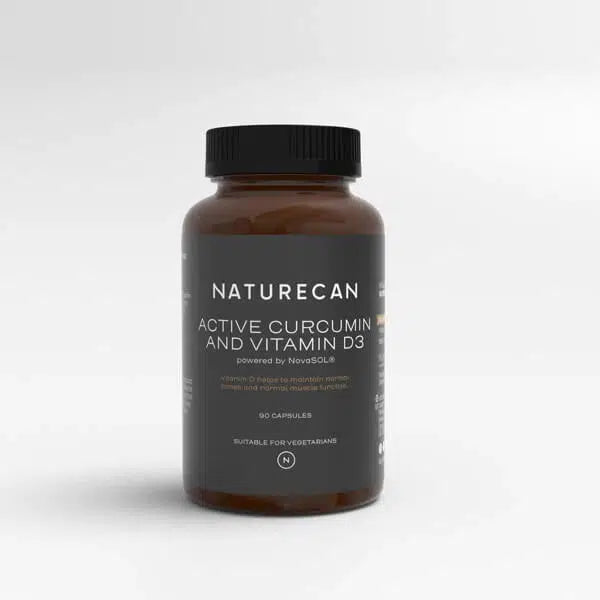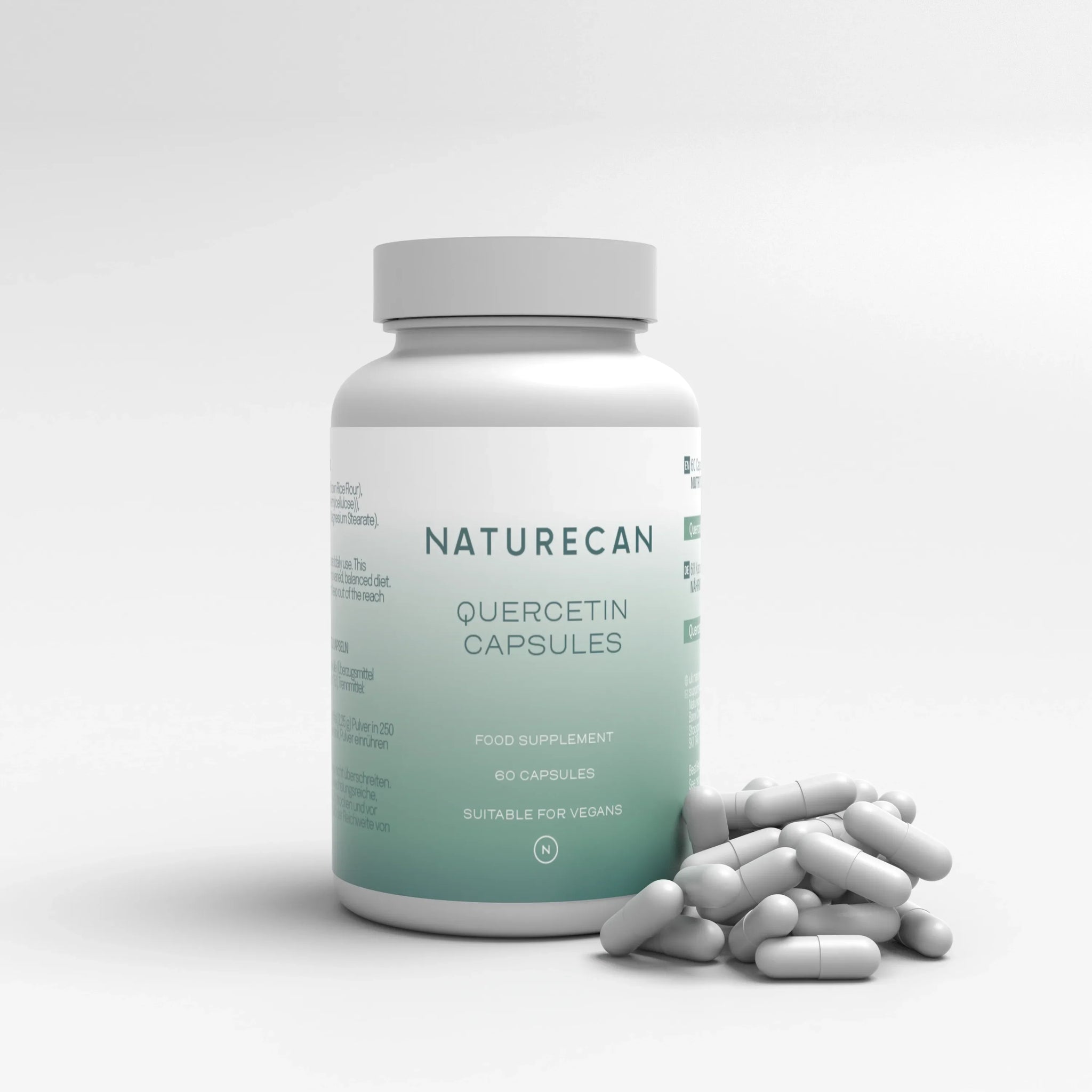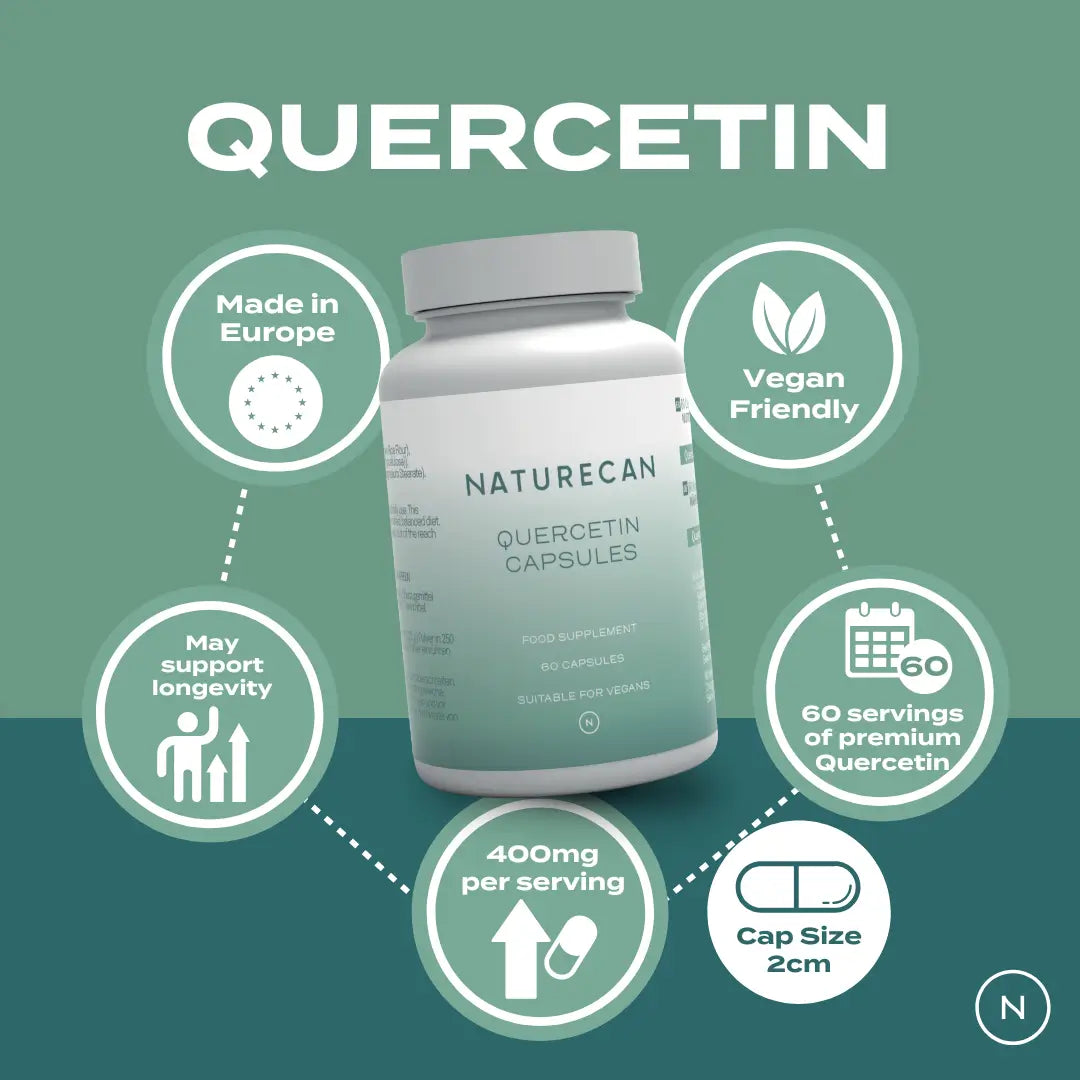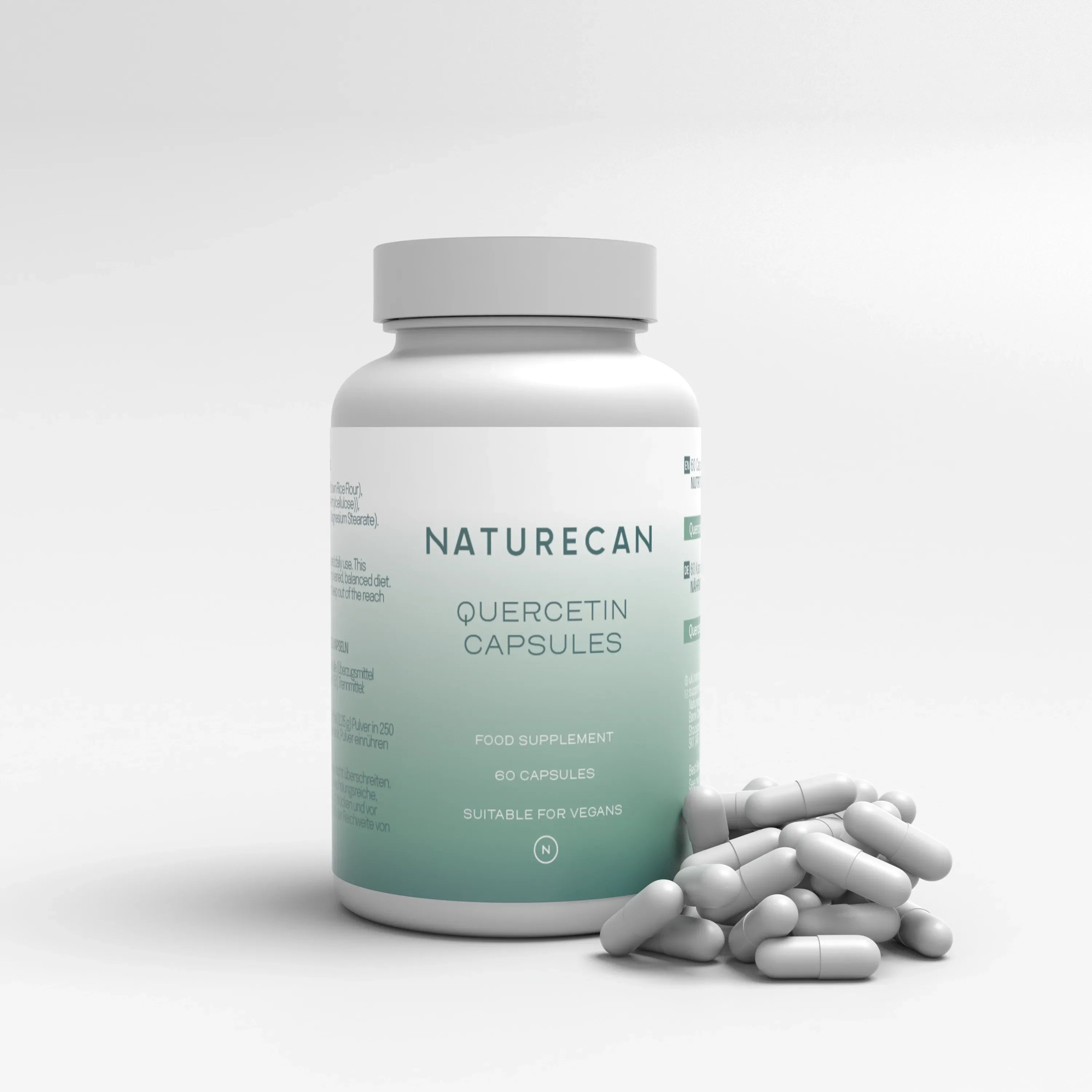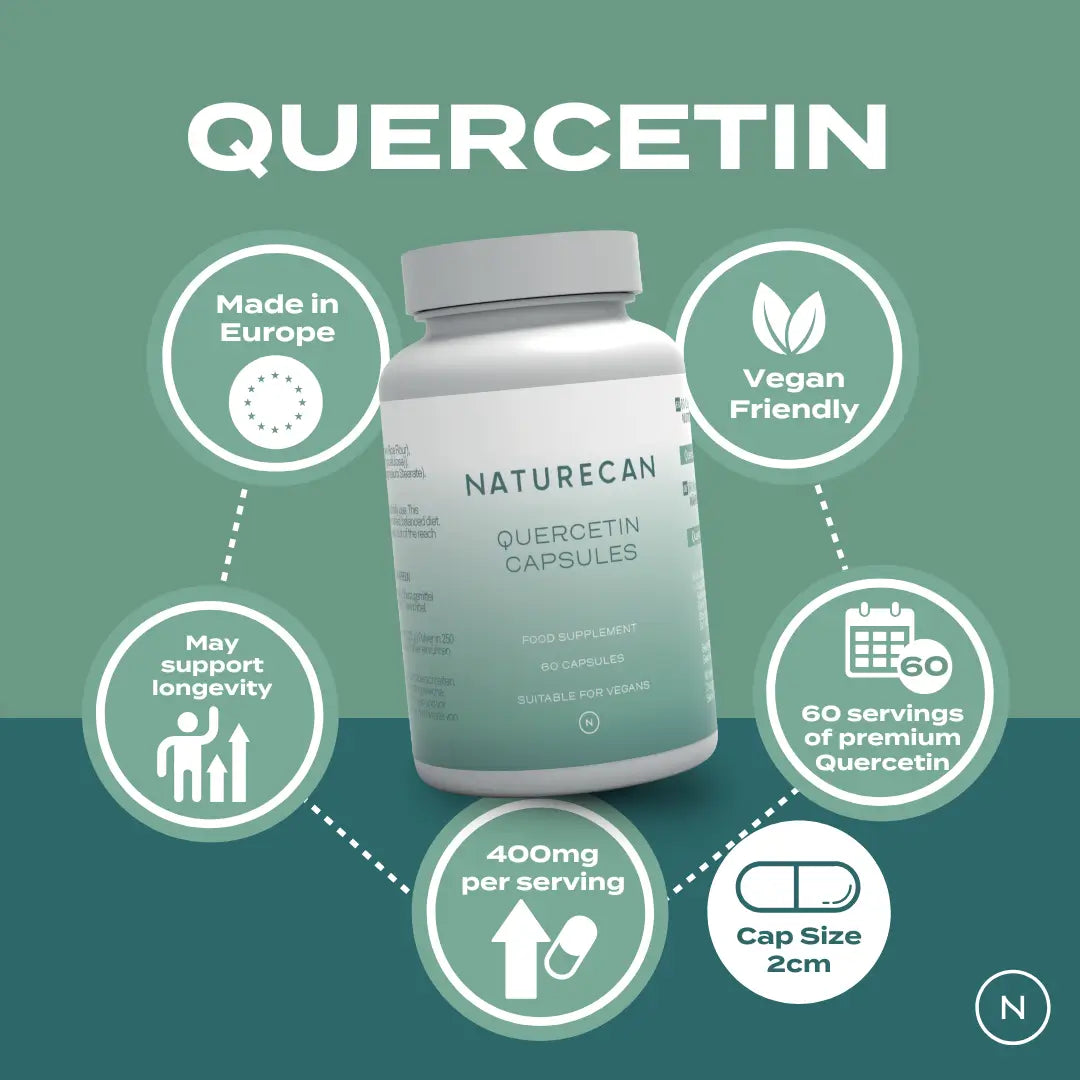Quercetin: Benefits, Dosage, Foods & Side Effects

Written by Valeria Briancesco & Reviewed by Paul Holmes.
Agenda
- Quercetin, a bioactive flavonoid, has become increasingly popular in the health and wellness community due to its potential benefits as a natural supplement.
- Known for its potential antioxidant properties and broad range of applications, quercetin is used by many seeking to support their overall well-being.
This article will explore what quercetin is, its benefits, dietary sources, dosage recommendations, and potential side effects to help you understand how this powerful flavonoid can fit into a balanced health regimen.
What is Quercetin?
Quercetin is a flavonoid, a type of plant pigment found in many fruits, vegetables, and grains. Quercetin is one of the most abundant dietary flavonoids present in various foods, including fruits like citrus and apples, vegetables such as onions and broccoli, and beverages like tea and red wine. It is particularly abundant in foods like apples, onions, and berries.
Flavonoids such as quercetin are known for their potential antioxidant properties, which may help neutralise free radicals and reduce oxidative stress.
This reduction in oxidative stress could contribute to better overall health by potentially lowering the risk of chronic diseases and slowing the ageing process¹. approximately 45 years in 1900 to over 75 years today.
This significant improvement is a testament to advancements in healthcare, nutrition, and overall living conditions. Understanding the factors that contribute to longevity is crucial for developing effective strategies to promote healthy ageing and extend the human lifespan.
The potential antioxidant capability of quercetin may support cellular health, protecting against damage that can lead to a variety of health concerns. By incorporating more quercetin-rich foods into your diet or using supplements, you may bolster your body’s natural defences against environmental and internal stressors².
Quercetin Explained: Inflammation, Immunity & More
In this video, Dr. Peter Osborne dives into the powerful benefits of quercetin—a plant-derived flavonoid— explaining how it supports inflammation reduction, immune function, heart health, blood sugar, and even allergy relief.
- Powerful antioxidant and anti-inflammatory effects.
- Supports cardiovascular health and blood sugar balance.
- Natural allergy support and immune resilience.
Video by Dr. Peter Osborne – Nutritional expert & author
*Dr. Peter Osborne is not affiliated with Naturecan and does not work with us.
Introducing Naturecan's Quercetin Supplement
Key Benefits:
- Anti-inflamatory & anti-viral properties
- Antioxidant that helps combat ageing
- Helps promote healthy immune system function
- May help lower blood pressure & improve overall cardiovascular function
3 Quercetin Health Benefits You Should Know
1. Primary Benefits: Quercetin Reduces Blood Pressure
Quercetin’s properties contribute to numerous potential health benefits:
- Anti-inflammatory Effects: Quercetin may help reduce inflammation, which is linked to various chronic illnesses, including heart disease and arthritis³.
- Antioxidant Properties: As a possible antioxidant, quercetin could combat oxidative stress, thereby supporting cellular health and potentially delaying signs of ageing⁴.
- Immune Support: Quercetin is often cited for its role in boosting the immune system and may aid in protecting against seasonal illnesses⁵.
- Cardiovascular Health: Some studies suggest that quercetin may contribute to heart health by improving blood vessel function and reducing blood pressure levels⁶.
- Metabolic Syndrome: Quercetin could potentially help mitigate risks associated with metabolic syndrome, including heart disease, stroke, and diabetes.
2. Quercetin Benefits for Skin
Clinical st
User testimonials also highlight visible improvements in skin tone and texture after consistent use. Although more research is needed in this area.

3. Quercetin for Dogs
Quercetin may also benefit dogs, particularly as a possible natural antihistamine for allergy relief. It has been used to manage allergy symptoms in dogs, including itching and inflammation⁹.
Quercetin works by stabilising mast cells, which release histamines that trigger allergic reactions.However, it’s important to consult a veterinarian before adding quercetin to your pet’s diet to ensure safe use¹⁰.

Quercetin Dosage Explained
Typical dosage recommendations for adults range from 500 mg to 1,000 mg per day, but this can vary based on individual needs, health conditions, and goals.
Higher doses may be considered for specific health concerns but should be done under the guidance of a healthcare professional¹.Quercetin supplementation may reduce blood pressure and improve other health markers.
Factors such as age, overall health, and the use of other supplements or medications can influence the ideal dose.
Find Naturecan’s quercetin supplements with clear dosage guidance.
How to know if I have high blood pressure?
5 Foods High in Quercetin
In addition to supplements, quercetin can be found naturally in a range of foods:
- Onions: Particularly red onions, which have high levels of quercetin³.
- Capers: One of the richest natural sources of quercetin⁴.
- Berries: Such as blueberries and cranberries⁵.
- Leafy Greens: Including kale and spinach⁶.
- Apples: A common source of quercetin².
Incorporating these foods into a balanced diet can help boost quercetin intake.
Increasing dietary flavonoid intake can improve health outcomes by reducing inflammation and supporting cardiovascular health.
Are Bananas High in Quercetin?
Bananas do contain quercetin, but not in significant amounts compared to other fruits like apples and berries¹⁷. While bananas are nutritious and beneficial to include in a balanced diet, they are not the most potent source of quercetin⁸.
3 Quercetin Health Benefits You Should Know
When choosing a quercetin supplement, look for products that ensure high purity, appropriate dosage, and added beneficial ingredients for enhanced absorption⁹. It is also important to consider the timing and safety of taking quercetin supplements and to consult a healthcare professional due to potential interactions with medications.
Is Quercetin Safe to Take Daily?
Quercetin is generally considered safe for daily use when taken within the recommended dosage range.
Most studies have not shown significant adverse effects associated with long-term use². However, as with any supplement, it’s advisable to consult a healthcare provider, particularly if you have pre-existing health conditions or are taking other medications².
For further queries, you can find Supplement Answers here.
What Drugs Cannot Be Taken with Quercetin?
Quercetin may interact with certain antibiotics and blood thinners³. This interaction can affect the efficacy of these medications, so it’s important to consult a healthcare professional before taking quercetin if you are on prescription drugs⁴.
Who Should Avoid Quercetin?
Individuals with specific health conditions or those taking certain medications, such as blood thinners or immunosuppressants, should avoid quercetin unless advised by a healthcare provider².

Is Quercetin a Natural Antihistamine?
Quercetin may function as a natural antihistamine by stabilising the release of histamines, which helps manage allergy symptoms. This property makes quercetin a popular natural option for those seeking relief from seasonal allergies². Research supports its role in reducing allergic responses and improving comfort during allergy seasons²·.
Explore Naturecan’s Vegan Multi-Vitamins to boost cellular health and longevity.
Summary
Quercetin is a natural flavonoid found in many fruits and vegetables, known for its powerful antioxidant and anti-inflammatory properties. The flavonoid, quercetin, may have antioxidant and anti-inflammatory properties, inhibiting inflammatory enzymes and reducing levels of inflammatory mediators.
Quercetin offers various potential health benefits, such as supporting immune function, promoting cardiovascular health, and contributing to healthy skin. While generally safe for daily use, proper dosage and consultation with a healthcare provider are recommended to avoid interactions or side effects. Quercetin can be obtained through a balanced diet rich in foods like apples, onions, and berries or through high-quality supplements.
Understanding its benefits, safe use, and potential interactions is essential for integrating quercetin into a health-focused lifestyle effectively.

10 Best Longevity and Anti-Ageing Supplements
Discover the top 10 supplements to support your health and longevity!
Read Article
What Supplements Does Andrew Huberman Recommend?
Read now to learn the supplements that Prof. Huberman recommends!
Read Article
8 ways: how to boost your immune system
Want to enhance your immune system naturally, read our comprehensive guide!
Read Article